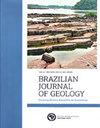巴西南里奥格兰德州南卡帕拉帕瓦地区圣玛利亚铅锌(铜银)矿床同位素研究
IF 0.9
4区 地球科学
Q3 GEOSCIENCES, MULTIDISCIPLINARY
引用次数: 2
摘要
Camaquã矿山位于巴西南里奥格兰德州中南部地区,含有最大的贱金属矿床(Camaquã, Cu;Santa Maria, Pb-Zn)在Camaquã盆地。寄主岩为Santa Bárbara群的砂岩、砾岩和地层位置不明确的互层火山岩。在矿化浅裂岩中发现了浅裂岩特征。另一组粗质岩的年龄为565±5 Ma (U-Pb LA-MC-ICP-MS),首次对Camaquã矿区的Acampamento Velho组进行了鉴定。地层关系表明,这两种岩石都代表了这种岩浆活动。Pb同位素数据和野外观测的空间关系表明,Acampamento Velho组与Camaquã成矿作用可能存在成因联系。铅同位素数据还表明,铅和其他金属的主要来源是较老的地壳(1.07 Ga模式年龄),可能是中间或混合来源,表明岩浆热液流体从基底渗透岩石中浸出金属。本文章由计算机程序翻译,如有差异,请以英文原文为准。
Isotopic study of the Pb-Zn (Cu-Ag) Santa Maria Deposit, Caçapava do Sul Region, Rio Grande do Sul, Brazil
The Camaquã Mines, in the central-southern region of Rio Grande do Sul State, Brazil, contain the largest deposits of base metals (Camaquã, Cu; Santa Maria, Pb-Zn) in the Camaquã Basin. The host rocks are consisted of sandstones and conglomerates of the Santa Bárbara Group and interbedded volcanic rocks of undefined stratigraphic position. Peperitic features were identified in a mineralized trachytic sill. An age of 565 ± 5 Ma (U-Pb LA-MC-ICP-MS) was obtained for another trachytic rock, which allowed for the identification, for the first time, of the Acampamento Velho Formation in the Camaquã Mines region. Stratigraphic relations demonstrate that both rocks represent this magmatism. Data from Pb isotopes and spatial relationship observed in the field indicate a possible genetic link between Acampamento Velho Formation and Camaquã mineralization. Pb isotopic data also suggest a predominantly older crustal source (1.07 Ga model age) for Pb and possibly for the other metals, with intermediate or mixed origin, suggesting that magmatic-hydrothermal fluids leached the metals from the percolated rocks of the basement.
求助全文
通过发布文献求助,成功后即可免费获取论文全文。
去求助
来源期刊

Brazilian Journal of Geology
GEOSCIENCES, MULTIDISCIPLINARY-
CiteScore
3.20
自引率
7.10%
发文量
12
审稿时长
11 weeks
期刊介绍:
The Brazilian Journal of Geology (BJG) is a quarterly journal published by the Brazilian Geological Society with an electronic open access version that provides an in-ternacional medium for the publication of original scientific work of broad interest concerned with all aspects of the earth sciences in Brazil, South America, and Antarctica, in-cluding oceanic regions adjacent to these regions. The BJG publishes papers with a regional appeal and more than local significance in the fields of mineralogy, petrology, geochemistry, paleontology, sedimentology, stratigraphy, structural geology, tectonics, neotectonics, geophysics applied to geology, volcanology, metallogeny and mineral deposits, marine geology, glaciology, paleoclimatology, geochronology, biostratigraphy, engineering geology, hydrogeology, geological hazards and remote sensing, providing a niche for interdisciplinary work on regional geology and Earth history.
The BJG publishes articles (including review articles), rapid communications, articles with accelerated review processes, editorials, and discussions (brief, objective and concise comments on recent papers published in BJG with replies by authors).
Manuscripts must be written in English. Companion papers will not be accepted.
 求助内容:
求助内容: 应助结果提醒方式:
应助结果提醒方式:


